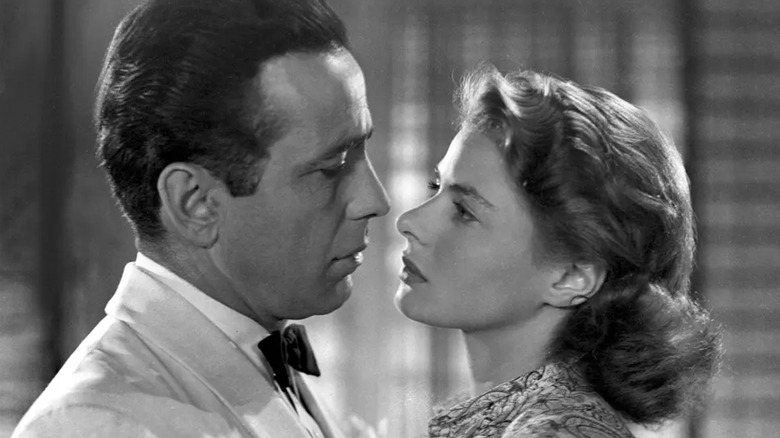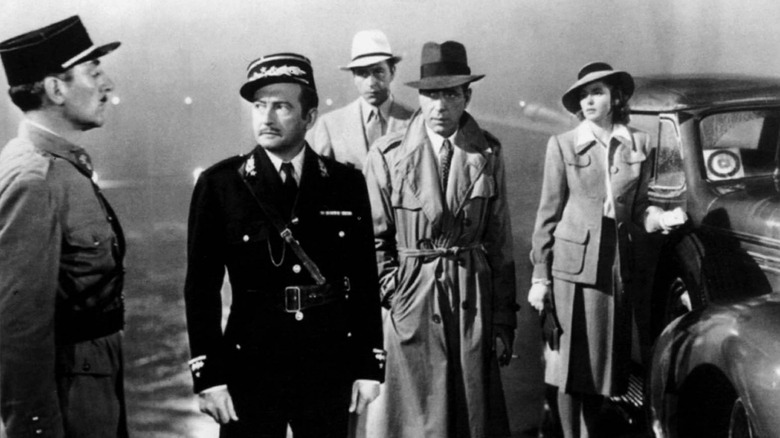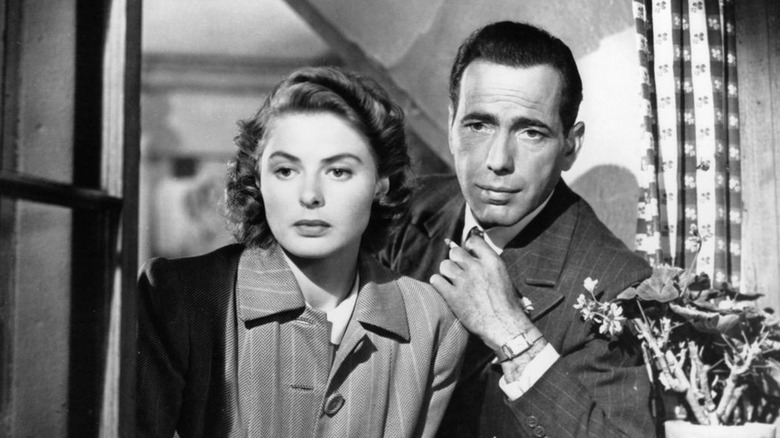The Chaotic Way Casablanca's Script Was Put Together
For a film of any pedigree, a perpetually-changing screenplay and a bevy of behind-the-scenes drama usually points to imminent disaster — at least by today's standards. Back in Hollywood's Golden Age though, that wasn't always the case. One of the greatest examples of this might be "Casablanca," your favorite movie critic's favorite movie. Today the film reigns supreme as one of the greatest on earth, with lines of dialogue so intrinsically linked to the public zeitgeist that many have no clue where they first originated.
The film follows the American expat Rick Blaine (Humphrey Bogart), who owns a nightclub in the heart of the titular Moroccan city. It's 1941, World War II is in full, gruesome swing, and the country is under French-led, Nazi-puppeted jurisdiction. Rick is decidedly neutral on all matters political — that is, until the woman who once broke his heart, Ilsa Lund (Ingrid Bergman), arrives in Casablanca with her husband Viktor Laszlo (Paul Henreid), a freedom fighter seeking asylum from Nazi rule. As fate would have it, only Rick has the power to secure safe passage for Viktor. But the more time he spends with Ilsa, the harder it is to let her go again.
"Casablanca" is many things to many people. A war drama, a star-crossed romance, a political commentary, a sleek and witty template for countless imitators. All these elements are woven adeptly into the fabric of the film, creating what many deem a perfect script and story. Ironically, its production wasn't nearly as cohesive as the finished product. The screenplay constantly changed under a number of squabbling writers, even up until the last day of production.
A Stroke of Luck
Just as "Casablanca" begins in 1941, so does the story of the film's production. Warner Bros. first discovered the unproduced play that would inspire the film, "Everybody Comes to Rick's," immediately after the Japanese attack on Pearl Harbor (via NY Post). Producer Hal B. Wallis scored the rights in January 1942, and was instrumental in selecting director, cast and crew as production began.
The film easily could have been a copy-paste of "Everybody Comes to Rick's," especially with such a tight turnaround in mind. But the actual script was never 100% complete, not even as the final scene was shot that same year. This was due in part to tweaks to certain characters, and in part to the revolving door of writers who all, at one point, had their hands on the constantly shifting script.
Wallis first tapped Julius and Philip Epstein, twin scribes who would pen some of the film's most famous lines ("Round up the usual suspects," anyone?). The Epsteins briefly abandoned the project to work on war documentaries with acclaimed director Frank Capra, and that paved the way for Howard Koch to take over in their absence. The three would become the only writers credited for "Casablanca," but others — like Casey Robinson, producer Wallis, and director Michael Curtiz — would still shape the script in indelible ways.
The Not-So-Usual Suspects
Warners Bros. brought the "Casablanca" cast together in a similar whirlwind. Most of the studio's initial choices fell through. But Wallis, who had near unlimited power to cast anyone, took this in stride. He handpicked Humphrey Bogart for the lead role, and bent the script to accommodate his plain-spoken leading man. It was Casey Robinson, one of Warner Bros. best screenwriters, who transformed Ilsa's character from an American divorcée to a European refugee — a perfect fit for Swedish actress Ingrid Bergman.
Despite perfect casting on nearly all fronts, everyone seemed to have their own problems with the script. No one knew whether Ilsa would remain with her husband Viktor, or rekindle her flame with Rick. Bergman, according to her memoirs, was advised to "play it in between" the two prospective lovers to the very end. Bogart himself had issues with Curtiz's direction in that final scene, where Rick finally makes his noble sacrifice in letting Ilsa go. He and Curtiz fought so intensely over his line delivery that Wallis himself had to break the two up.
That same scene was rife with even more last minute additions. One of the more satisfactory bits of the conclusion, where Rick chooses to join the Free French with his former foe Captain Renault (Claude Rains), was introduced right on set. Even after shooting wrapped, dialogue changes were still being made. Bogart was called back during post-production to record the iconic "I think this is the beginning of a beautiful friendship," thankfully the last extraneous addition.
As Time Went By
"Casablanca" was originally slated for release in the summer of 1943, but after Allied forces invaded the real Casablanca in November 1942, Warner Bros. pushed the film to premiere that same month. To say that their Thanksgiving opening was successful would be a gross understatement: As Casablanca became a more integral presence on the world's stage, so too did "Casablanca" grow in popularity. The film's favorable word of mouth carried it all the way to three Oscar wins in 1943: for Best Screenplay, Director, and Picture.
In today's Hollywood, a strong artistic vision from a powerhouse director is all that seems to matter. It feels unthinkable now for a film to be subject to so many perspectives as "Casablanca" was. With constant additions and changes, and scenes that were being rewritten in the very midst of production, "Casablanca" could have crashed and burned. But the film works because its disparate threads are woven so seamlessly together.
It's a bit ironic considering the reluctance most had to the script, even in its hastily-cobbled stage. Julius Epstein argued that "Casablanca" had more corn in it "than in the states of Kansas and Iowa combined." That the film is now recognized as one of the most comprehensive stories of the 20th century might have had more to do with luck than anything else. But if that is the case, I'd say we're also lucky it turned out that way. The cast and crew were all under exceeding pressure to turn "Casablanca" around within a year, and — at the risk of leaning into corn myself — all that pressure did, in fact, make quite the diamond.



